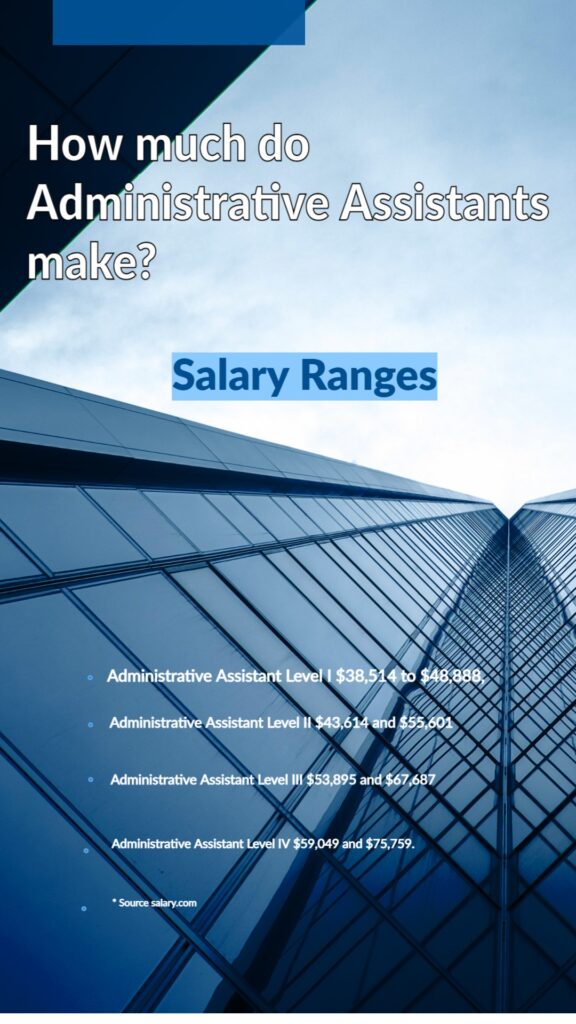The Administrative Assistant Career Path-And What Skills You Need To Advance
What is an administrative assistant?
An administrative assistant is an administrative professional. These professionals work in support of the work of others. In general, they deal with paperwork, scheduling and planning, data entry, and scheduling. They typically have tasks that require sitting at a desk all day and follow set procedures to complete their jobs quickly.
What tasks does an administrative assistant typically have? – General information gathering: the administrative assistant will be in charge of organizing an organization’s paper files and writing memos or reports based on those files. They will also prepare scripts for meetings with customers, vendors, and employees.
Here is what the Bureau of Labor Statistics Occupational Outlook Handbook says Administrative Assistants do:
“Secretaries and administrative assistants perform various clerical and administrative duties that are necessary to run an organization efficiently. They use computer software to create spreadsheets; manage databases, and prepare presentations, reports, and documents. They also may negotiate with vendors, buy supplies, and manage stockrooms or corporate libraries. Secretaries and administrative assistants also use videoconferencing, fax, and other office equipment. Specific job duties vary by experience, job title, and specialty.”
In other words, the job of an administrative assistant is to get work done and make sure that the organization runs smoothly. They do a little of everything, plus there are many opportunities to advance into finance/bookkeeping, human resources, marketing, office manager, and more if they get the skills they need to do so. You have a choice. You can do the minimum required, but you will have a more challenging time advancing, or you can use this opportunity to enhance your skills and move up to get a much higher salary.
Table of Contents
Administrative Assistant Job Skills

What qualifications do administrative assistants need?
Administrative assistants must be able to perform several tasks to be competitive. These are only a few of the hard and soft skills that managers seek in new administrative assistants:
- Basic computer literacy – Administrative assistants spend a significant amount of time on computers, specifically word processing, database, spreadsheet applications, and the internet. It is especially important to be familiar with Microsoft Office.
- Organization – Administrative assistants rely on their organizational and time management abilities to keep plans straight and multitask on many clerical tasks.
- Strong Communication skills – Administrative assistants must communicate with other employees and visitors to the company, as well as write letters, emails, and social media posts using proper grammar and spelling.
- Engaging personality – As the first point of touch for many employees and visitors, an appealing personality is essential.
- Attention to detail – Administrative assistants must ensure that all assignments are performed to a high standard and without errors. You’ll also need this ability when proofreading drafts of reports and letters that you’ve been asked to type.
- Team player – Administrative assistants play an important role in the activities of every organization, so they must be able to collaborate with other members of the team.
- Self-starter – Administrative assistants must frequently use their initiative to avoid distracting executive-level and management workers.
- Strong numeracy skills – This is particularly true for administrative assistants who are in charge of bookkeeping.
- Problem-solving abilities – Administrative assistants use these abilities when clients need to postpone meetings and appointments, when supplies are late, or when other organizational emergencies occur.
- Flexibility – The responsibilities of an administrative assistant can vary significantly from day to day. They depend on their adaptability to meet the demands of each day and succeed at whatever mission is assigned to them.
- Strong work ethic – Administrative assistants’ role is critical to the activities of their organizations. A strong work ethic is needed to complete all tasks on time.
How do I get an administrative assistant job with no experience?
The above skills should be enough to get you hired for an entry-level position, but your income will be less than you could be earning unless you add more technical skills. To start off with here is the first one to get that will have the most positive impact:
-Microsoft Office
If you have advanced skills with Microsoft Excel, you will be highly valued. With all the new features, Microsoft PowerPoint is more popular than ever. You should also learn Word, Outlook, and Access. Get certified as a Microsoft Office Specialist (MOS) and you will always be in demand.

What Skills do I need to Advance?
Technical skills increase your value to your employer, which will help you advance and make more money. They separate you from the competition and increase your marketability, plus they help you move up into a higher-level career path. Get at least one of these to command a bigger paycheck:
–QuickBooks. This is the software program of choice for small and medium-sized businesses for payroll, accounts payable, and accounts receivable. If you get certified in QuickBooks, it can help you advance towards a finance/bookkeeping role
–Adobe Suite If you can do the graphics for flyers, marketing pieces, etc., that is another good way to advance, plus this could lead to a marketing role.
–SHRM Many times, Administrative assistants perform HR duties. If you meet the requirements, getting the SHRM certification (either SHRM-CP or SHRM-SCP) will give you an excellent opportunity to advance into an HR leadership role. Here are the requirements:
| Less than Bachelor’s Degree | Bachelor’s Degree | Graduate’s Degree | ||||
| Credential | HR-Related Program | Non-HR Program | HR-Related Degree | Non-HR Degree | HR-Related Degree | Non-HR Degree |
| SHRM-CP | 3 years in HR role | 4 years in HR role | 1 year in HR role | 2 years in HR role | currently in HR role | 1 year in HR role |
| SHRM-SCP | 6 years in HR role | 7 years in HR role | 4 years in HR role | 5 years in HR role | 3 years in HR role | 4 years in HR role |
–Power BI or Tableau. These are terrific tools to use to visualize data, so analysts, program managers, and decision-makers can understand the data coming in so they can make better business decisions. If you learn how to use either or both of these tools, you can make your boss’ job much more manageable, plus this could help you advance into an analyst role.
How are you going to get these skills? If you are unemployed, you might qualify for a grant that will pay for them. Call us at 813-428-2409 to see if you qualify.
Career Trajectory for Administrative Assistants
Administrative assistants can advance to more senior roles with greater responsibility as they gain experience. An entry-level administrative assistant, for example, can move to the position of an executive administrative assistant or office manager. If you want to progress as an administrative assistant, you can learn more about your company’s activities and add certifications to your skillset.
Motivated administrative assistants can be transferred to other divisions within their organization, such as accounting or information technology, in some situations. Obtaining formal qualifications in each of these fields will increase an administrative assistant’s chances of advancing.
Administrative assistants who remain with the same company and learn all they can about it instead of seeking opportunities at different organizations can often see their loyalty to the company be rewarded with more opportunities to advance.
If you want to join the workforce rather than continuing your education after high school, you may find that getting a job as an administrative assistant to be an excellent option. Because of the wide variety of responsibilities and business sectors that employ administrative assistants, this role can be fascinating and demanding.
How much do Administrative Assistants make?
For the average salaries and ranges, I like to use Salary.com because they break it down depending on your level. According to them:
Administrative assistant I
The base salary for Administrative Assistant I ranges from $38,514 to $48,888, with an average base salary of $43,042. When you add incentives, the average total cash compensation of $43,941.
Administrative assistant II
The average Administrative Assistant II salary in the United States is $49,020 (as of May 27, 2021). The the range typically falls between $43,614 and $55,601.
Administrative assistant III
The average Administrative Assistant III salary in the United States is $60,325 (as of May 27, 2021). The range typically falls between $53,895 and $67,687.
Administrative assistant IV
The average Administrative Assistant IV salary in the United States is $66,925 (as of May 27, 2021). The range typically falls between $59,049 and $75,759. Salary levels can differ greatly based on a variety of factors, including qualifications, certifications, additional skills, and the years of experience in your field.
As you can see, your salary can increase nicely by adding to your skillset.
Career Paths for Administrative Assistants
Office administrator
Primary responsibilities: Office administrators manage an office’s administrative personnel. They ensure adherence to a company’s policy, plan office operations, and keep an office’s supply stock up to date.
Human resources coordinator
Primary duties: A human resources coordinator coordinates the work of the company’s human resources. They make sure employees are comfortable and productive and maintain good business relationships with them. Their job is to manage people on an organizational level, not just their specific role in it.
To do this effectively, they have to be very organized and should be able to perform multiple tasks on a given day. They would also need strong interpersonal skills (for example, listening) and strong analytical skills (for example, writing).
Executive secretary
Primary duties: Similar to an administrative assistant, but typically a more senior role:
Executive secretaries serve the financial and clerical needs of a company’s top executives. They organize their travel and schedule, notify them of new meetings, and write correspondence.
Accounting clerk
Primary duties: Accounting clerks compile and sort invoices as well as checks. They collect reports, reconcile bank statements, and process several business transactions using accounting software programs.
Marketing coordinator
Primary duties: Marketing coordinators remain current on business trends, the market, and the competition. They also carry out publicity and promotional campaigns, track sales data, and prepare reports. In some cases, they help prepare graphics for different campaigns.
Operations coordinator
Primary duties: Operations coordinators ensure that an organization runs smoothly. They assist in human resource allocation, staff training, budget management, and event planning.
Office manager
Primary duties: Office managers coordinate administrative tasks in an office to ensure that everything runs smoothly. They order office materials, plan meetings, coordinate business activities, and oversee the administrative staff’s work.
Business Analyst
Primary duties: They write reports to look and see what’s working and what’s not working in an organization. They present reports or information so that it is easy for other people to understand.
Career Tips for Administrative Assistants
Know and plan your next step up
Working as an administrative assistant introduces you to a wide range of business functions. Learn about the tasks you like the most and the qualities you need to develop. For example, if you enjoyed dealing with personnel problems as an administrative assistant, you may want to consider working in Human Resources. Do you like working with numbers? If so, you might prefer a career in accounting or bookkeeping.
There are a few options available to you to advance your career or get a promotion. Some strategies are as simple as handling yourself in the workplace, while others are as complex as the assistance you may obtain from others.
Here are a few examples:
- Demonstrate your willingness to take on more responsibility than is currently required of you. Consider your job responsibilities and what you can do to improve your performance at work. You may also volunteer to assist other agencies in need and make recommendations when problems occur in your region.
- Pay attention to your boss’s work ethic and lead by example. If you can adopt your boss’s attitude and work ethic, they can value you more and look to you for ongoing assistance and guidance. The more you demonstrate dependability, the more likely it is that you will be considered for advancement.
- Add to your skillset, especially technical skills. The more skills you obtain, the more you can help your employer. If you master Microsoft PowerPoint, you can help your boss create more interesting presentations. Gaining expertise in Excel means you can help your office with better spreadsheets. Learn Power Bi, and decision-makers can analyze the data more efficiently and make better decisions.
Develop your skills
Work on enhancing your skills once you’ve decided on your next career move. Investigate job requirements for positions that attract you and concentrate on learning the necessary skills. Consider taking lessons to get the certifications you need to advance. See if your employer offers tuition assistance.
Highlight your transferable skills
Highlight any transferable skills in a way that highlights the ability to perform the job you’re applying for while writing a resume or cover letter for your next role. For example, if you want to work in customer service, you’ll need both problem-solving skills and empathy. Determine how you’ve displayed these skills in your current position as an administrative assistant. Then, explain any instances in which you successfully applied these skills in your current or previous roles. This will help hiring managers see you as a good choice for the position they’re looking to fill. Ensure that you match your verbiage with the job description so your resume and application get past the applicant tracking system filters.
Next Steps
We can help you get started if you think Administrative Assistant may be the career for you. Call or make an appointment to learn about the career opportunities and figure out which path makes the most sense for you. Let’s see if you qualify for a federal grant or other options that can put you on your way towards an exciting career.
See if you Qualify for a WIOA Grant
Are you unemployed? There is a little known federal grant program that can pay for you to get trained, certified and placed in your career at no cost to you. Availability and amounts are based on where you live. If you qualify, this program can pay up to $10,000 to get trained, certified, and then get help getting placed in their career. The amount and availability vary by county
This can be used to get certified in fields such as Cyber-Security, Information Technology, Project Management, Business Analysis, and more. Some of the most highly sought-after certifications include CompTIA, Microsoft, Cisco, Project Management Professional (PMP), Scrum Master, and others.






